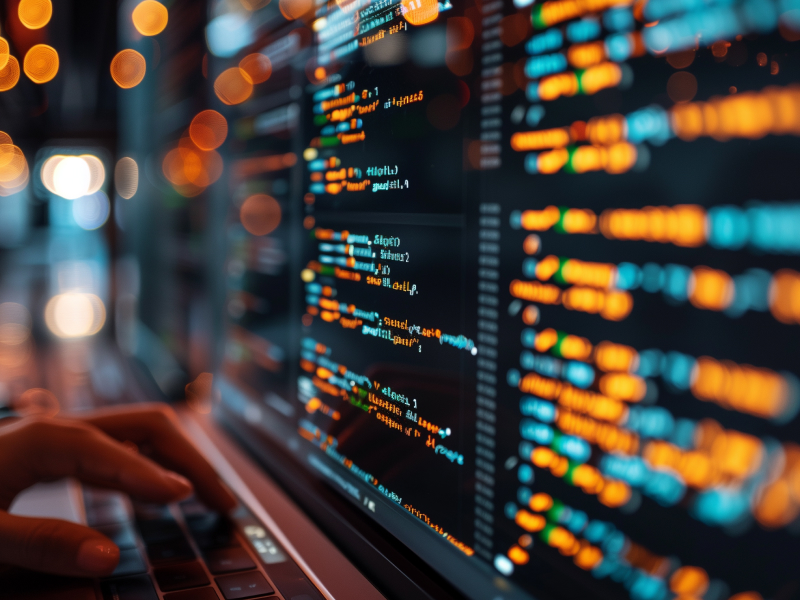Why most software engineers are turning to GenAI for coding
GenAI adoption among software engineers is widespread, pointing to a shift in how development teams approach their work. Today, 72% of software engineers integrate GenAI into their development process—a clear indicator that GenAI is quickly becoming a staple in the coding toolkits of many engineers.
Nearly half (48%) of engineers report using GenAI daily, indicating the tool’s perceived value, as engineers rely on it for routine tasks. The fact that 81% of engineers use GenAI to write code they previously wrote manually highlights how GenAI is reshaping coding as we know it.
Despite its widespread use, 40% of engineers express that GenAI has not necessarily freed up time for other tasks—suggesting that while GenAI is accelerating certain aspects of the coding process, it may not yet be optimizing engineers’ overall workflow.
The traditional, time-consuming process of manual coding is being augmented, if not partially replaced, by AI-generated assistance.
Engineers may still spend a large amount of time on tasks that require manual oversight and refinement, such as debugging or integrating AI-generated code with existing systems.
A Thomson Reuters survey showed that only 12% of white-collar workers in sectors such as legal, tax, accounting, and government currently use GenAI. To add to this, just 11% have active plans to integrate it into their work—reiterating the unique position of software engineers, who typically lead GenAI adoption.
How GenAI is rocketing productivity across engineering roles
Among those using GenAI, 23% report a productivity increase of 50% or more, which is particularly striking, showing that nearly a quarter of engineers using GenAI have seen their output effectively double.
Such a dramatic rise in productivity is rare and highlights the far reaching impact that GenAI can have when effectively integrated into development workflows.
Reinforcing this, 71% of engineers believe that their productivity has increased by 10%-25% since adopting GenAI—a more modest but still large improvement—suggesting that GenAI is broadly beneficial, even if it does not always lead to the extreme productivity boosts seen by the top quartile of users.
Only 6% of engineers report no change in productivity, indicating that the great majority of those using GenAI experience some level of efficiency gain.
Which engineering roles are cashing in on GenAI productivity
Certain roles within software development are particularly well-suited to reaping the benefits of GenAI. Site Reliability Engineers, DevOps professionals, GIS Developers, and Project Managers/Scrum Masters are seeing some of the highest productivity increases, with boosts ranging from 40% to over 50%.
These roles typically involve complex, repetitive tasks that are ideal for AI augmentation, making GenAI an invaluable tool in their daily operations.
For Data Scientists, the productivity increase averages 32%, which points to the growing importance of GenAI in data analysis and model development. Full-Stack Developers, who must juggle both front-end and back-end tasks, report a 27% productivity increase, showcasing GenAI’s versatility across different areas of software development.
GenAI is not just faster—it’s making code better
Looking past productivity, GenAI is also contributing to the quality of the code being produced. 74% of engineers believe that GenAI has improved the quality of their work to some extent—often stemming from GenAI’s ability to quickly provide suggestions and best practices, akin to how Grammarly aids in writing.
GenAI offers a second pair of eyes—or, in this case, algorithms—helping engineers catch potential issues and refine their code more effectively and accurately.
Specifically, 53% of engineers report a quality improvement of 10%-25%, indicating that for many, GenAI is doing more than speeding up the coding process; it’s ultimately improving the final product.
24%, on the other hand, believe there has been no change in the quality of their work, which may suggest that these engineers already had high-quality output or that GenAI’s contributions are more incremental in these cases.
Only 2% of engineers feel that GenAI has decreased the quality of their work, a minority that likely points to the still-developing nature of AI in certain contexts.
The real reasons engineers are embracing GenAI for coding
Why GenAI is a powerful companion for starting code snippets
Engineers are finding GenAI particularly useful for generating scaffolding or initial code snippets. These are the building blocks of larger systems that engineers can later refine and integrate. GenAI excels at generating these components quickly, greatly reducing the time spent on the initial stages of code creation.
It’s still important to note that GenAI is not yet capable of creating fully integrated systems or seamlessly piecing together existing codebases. Instead, it gives engineers the raw materials they need to build out complex systems, leaving the critical task of integration and refinement to human expertise.
Shifts from manual coding to editing and refining AI-generated code is changing how engineers work, pushing them towards roles that require more oversight and critical thinking.
GenAI is fast, not flawless
While GenAI offers major time savings, it’s not without its flaws. A considerable 63% of engineers report finding errors every time they use AI-generated code. Of these, 47% identify the errors as minor, while 16% encounter more serious issues—highlighting the current limitations of GenAI and the ongoing need for human oversight.
Interestingly, the ability to detect and correct these errors appears to correlate with experience. Engineers with 8+ years of experience are more likely to spot minor errors (49%) compared to their less experienced counterparts (39%). This suggests that while GenAI is a powerful tool, its effective use requires a solid foundation of knowledge and experience to make sure the final product meets desired standards.
The not-so-perfect side of GenAI in software development
Despite its many advantages, GenAI is not universally lauded for its ability to generate code. In fact, 20% of engineers believe that AI is not good at code generation. Skepticism here likely arises from the fact that AI-generated code often requires major revision before it can be fully integrated into a project.
Errors and inconsistencies produced by GenAI mean that while the tool is fast, it is not always accurate or reliable.
Yet, it’s this very speed that makes GenAI so valuable to many engineers. Even if the code is not perfect, rapid generation of initial drafts lets engineers shift their focus to refining and perfecting the code, rather than starting from scratch.
This workflow shift is akin to that of a chef adjusting a recipe: it’s easier to tweak an existing dish than to create one from the ground up. In this way, GenAI is elevating engineers from manual coders to managers of AI-generated content.
From coders to Creators – The new skills engineers need with GenAI
As GenAI becomes more integrated into software development, the role of engineers is evolving in lockstep. The traditional tasks of manual coding are giving way to more strategic and creative responsibilities. Engineers are now required to have a broader skill set that goes beyond technical proficiency.
Future sought-after skills will include creativity, problem-solving, critical thinking, and communication—abilities that complement the technical tasks GenAI can handle.
Collaboration among developers is becoming increasingly important as they work together to solve complex problems—which is reshaping software engineering and pushing engineers to adopt roles that resemble project orchestrators rather than just coders.
In this new environment, the ability to manage AI tools and integrate their outputs effectively will be as important as writing code itself.
Why software engineers are leading the AI revolution
Software engineers are leading GenAI adoption, taking advantage of its capabilities more extensively than professionals in other industries. While many sectors are still exploring the potential of GenAI, software engineers are already embedding it into their core functions.
Rapid adoption here has clearly suggested a trend toward increased efficiency and higher-quality software in the future, as GenAI continues to mature and evolve.
The early and enthusiastic embrace of GenAI by software engineers actively positions them as leaders in the broader AI revolution, setting the stage for continued innovation and advancement in the field.





